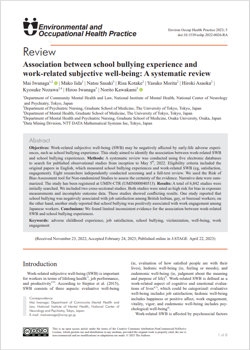#E0063 Do school bullying experiences affect workplace behavior?

Do school bullying experiences affect workplace behavior?
Aphorisms reiterate that life experiences make one stronger. Hence, these researchers assume that school bullying experiences can affect how a person embraces work-related subjective well-being (SWB) in adulthood. They maintain that it lowers self-esteem and self-evaluation and contributes to debilitating physical and mental health. SWB is affected by psychosocial factors, which can be influenced by physical and social conditions.
In this systematic review, the researchers sought to connect work-related SWB with school bullying in childhood. Using the guidelines for the Preferred Reporting Items for Systematic Review and Meta-Analysis, 4,623 articles were extracted from five social sciences databases in two stages—April 2020 and May 2022. After winnowing for appropriateness and duplication, only two studies were considered appropriate. Both were cross-sectional studies but conducted on different continents—the UK and Japan—and targeted two distinct populations. In the UK study, persons from the LGBT community were asked whether school bullying was due to sexual orientation, while the Japan study treated school bullying as an anti-social behavior. Another notable difference was the treatment of well-being. While the UK study explored evaluative well-being (e.g., job satisfaction), the Japan study examined hedonic well-being (e.g., work engagement).
The research was novel in its attempt to associate school bullying with work-related SWB, albeit the long-term impact was inconclusive. The UK study linked low job satisfaction with earlier childhood trauma, while the Japan study demonstrated a positive association. Notably, the researchers ascribed a different interpretation of the study as discretionary since satisfaction is evaluative, while happiness is hedonic.
Reviews are pivotal to the research field for demonstrating research gaps. The small number of studies on this subject suggests room for future explorations using different research techniques to arrive at more directed outcomes. How SWB is interpreted between the two cultures infers yet another variable in this assessment.
Investigations into workplace behavior continue to be of interest given the significant time humans invest in work-related activities in a brick-and-mortar building or at home. Moving forward, organizations may consider investing in more structured explorations given the investment made into human resources and the focus on work–life balance for mental health.

Link to the original journal article:
https://www.jstage.jst.go.jp/article/eohp/5/1/5_2022-0026-RA/_article
Title of the paper:
Association between school bullying experience and work-related subjective well-being: A systematic review
Authors:
Mai Iwanaga, Mako Iida, Natsu Sasaki, Risa Kotake, Yasuko Morita, Hiroki Asaoka, Kyosuke Nozawa, Hiroo Iwanaga, Norito Kawakami




